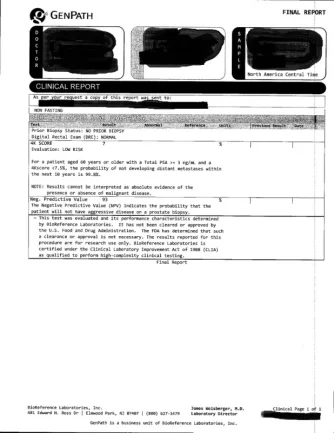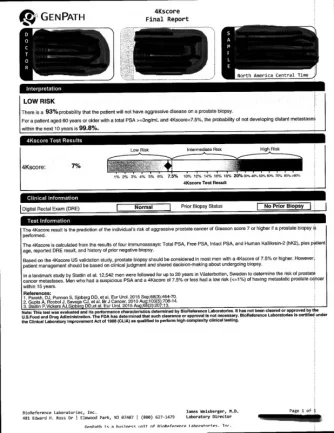Nelson Vergel
Founder, ExcelMale.com
The 4Kscore Is a Novel Blood Test That Can Accurately Identify the Risk of Aggressive Prostate Cancer
Prostate-specific antigen (PSA) screening for prostate cancer has successfully reduced prostate cancer mortality, but has led to significant problems of overdiagnosis and overtreatment. The major concern is that an overwhelming number of men are subjected to interventions such as prostate biopsy in order to prevent one man’s death from prostate cancer.
The most commonly used marker for detection of prostate cancer is serum PSA. However, the limitations of PSA are widely recognized. Alternative methods of utilizing PSA, such as PSA velocity and PSA density, have been reported to improve the specificity for prostate cancer detection. Although both PSA enhancements, at best, provide a slight improvement from PSA alone, these techniques are far from the magnitude of improvement needed to reliably discern between aggressive and indolent forms of prostate cancer.
The 4Kscore® Test (OPKO Lab, Nashville, TN) is a new blood test that accurately identifies the risk of aggressive prostate cancer; it plays an important clinical role as a reflex test prior to proceeding with initial prostate biopsy in men with an elevated PSA level or abnormal digital rectal examination results.
The four-kallikrein biomarkers that serve as the backbone of the 4Kscore Test have demonstrated excellent accuracy in detecting aggressive cancer, both in the biopsy and the radical prostatectomy specimens. By demonstrating an association to more meaningful endpoints and showing an ability to discriminate between lethal and nonlethal prostate cancer, the 4Kscore Test allows us to safely avoid prostate biopsy in men whose cancers are better left alone, and focus intervention on men who are most likely to benefit from it.
The test result itself is a personalized positive predictive value of finding Gleason score ≥ 7 cancer on biopsy of the prostate. This provides the patient and clinician with quantifiable information to aid in clinical decision making.
http://www.ncbi.nlm.nih.gov/pmc/articles/PMC4444768/
Prostate-specific antigen (PSA) screening for prostate cancer has successfully reduced prostate cancer mortality, but has led to significant problems of overdiagnosis and overtreatment. The major concern is that an overwhelming number of men are subjected to interventions such as prostate biopsy in order to prevent one man’s death from prostate cancer.
The most commonly used marker for detection of prostate cancer is serum PSA. However, the limitations of PSA are widely recognized. Alternative methods of utilizing PSA, such as PSA velocity and PSA density, have been reported to improve the specificity for prostate cancer detection. Although both PSA enhancements, at best, provide a slight improvement from PSA alone, these techniques are far from the magnitude of improvement needed to reliably discern between aggressive and indolent forms of prostate cancer.
The 4Kscore® Test (OPKO Lab, Nashville, TN) is a new blood test that accurately identifies the risk of aggressive prostate cancer; it plays an important clinical role as a reflex test prior to proceeding with initial prostate biopsy in men with an elevated PSA level or abnormal digital rectal examination results.
The four-kallikrein biomarkers that serve as the backbone of the 4Kscore Test have demonstrated excellent accuracy in detecting aggressive cancer, both in the biopsy and the radical prostatectomy specimens. By demonstrating an association to more meaningful endpoints and showing an ability to discriminate between lethal and nonlethal prostate cancer, the 4Kscore Test allows us to safely avoid prostate biopsy in men whose cancers are better left alone, and focus intervention on men who are most likely to benefit from it.
The test result itself is a personalized positive predictive value of finding Gleason score ≥ 7 cancer on biopsy of the prostate. This provides the patient and clinician with quantifiable information to aid in clinical decision making.
http://www.ncbi.nlm.nih.gov/pmc/articles/PMC4444768/













